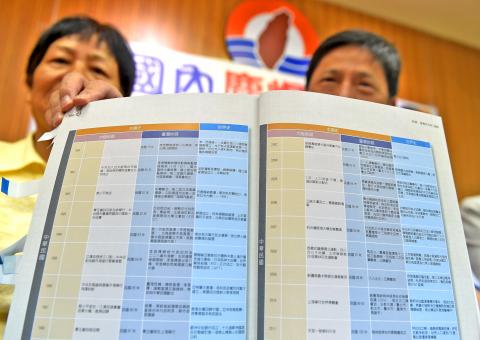The Taiwan Solidarity Union (TSU) caucus yesterday urged teachers not to use the new version of high-school social studies textbooks approved by the National Academy for Educational Research (NAER), which it said contain distorted and unsubstantiated historical information and aim to instill a China-centric mindset in young Taiwanese.
“The Ministry of Education has claimed that it was only responsible for reviewing high-school curricula and that it was up to textbook publishers to decide the content of the books they print,” TSU caucus whip Lai Chen-chang (賴振昌) told a news conference in Taipei.
However, Lai said that since the new curriculum has been “painted red,” most of the publishers have fallen in line, printing textbooks that do not conform to historical facts.

Photo: Chien Jung-fong, Taipei Times
Singling out the Shi Ji Cultural Publishing Co (史記文化事業), Lai said that the company combined the histories of Taiwan and China into what it called “national history,” which also included historical events that occurred during the Japanese colonial era.
“Shi Ji’s proprietor, Cheng Chih-shen (鄭旗生), doubles as the executive officer of the pro-unification Chinese Integration Association, while one of the firm’s textbook compilation committee members, Hao Ming-huang (邵銘煌), is the former director of the Chinese Nationalist Party’s [KMT] history department. Both men are considered ‘deep-blue’ diehards,” Lai said.
Lai said the publisher’s history textbook used the controversial term “returning to the embrace of the motherland” twice.
The book suggests that former president Lee Teng-hui’s (李登輝) formulation of the “two states theory” in 1999 hindered cross-strait negotiations, and the “one side, one country” model proposed by Lee’s successor, Chen Shui-bian (陳水扁), had destabilized Taiwan-US relations, Lai said.
The book has two full pages on the so-called “1992 consensus” embraced by President Ma Ying-jeou (馬英九) and also praises the Economic Cooperation Framework Agreement for elevating cross-strait exchanges to the next level. Lai said.
The “1992 consensus” refers to a tacit understanding that the KMT says was reached with Beijing that both sides agree that there is only “one China,” with each side having its own interpretations of what China is. Former KMT lawmaker (蘇起) said in 2006 that he had made up the term in 2000, when he was head of the Mainland Affairs Council.
“This is not a school textbook, but rather propaganda material designed to promote the KMT’s history and cross-strait unification,” Lai said, calling on high-school teachers not to use the new editions of book.
TSU Legislator Chou Ni-an (周倪安) said the lack of references in the books to democracy activist Deng Nan-jung (鄭南榕), the 228 Incident and the 1979 Kaohsiung Incident underscored the curriculum review team’s aim to cover up the former KMT regime’s disregard for human rights by creating the impression that the government had attached great importance to the issue.
“We as Taiwanese must stand up against the government’s brainwashing scheme and safeguard true human rights and democracy,” Chou said.

A magnitude 7.0 earthquake struck off Yilan at 11:05pm yesterday, the Central Weather Administration (CWA) said. The epicenter was located at sea, about 32.3km east of Yilan County Hall, at a depth of 72.8km, CWA data showed There were no immediate reports of damage. The intensity of the quake, which gauges the actual effect of a seismic event, measured 4 in Yilan County area on Taiwan’s seven-tier intensity scale, the data showed. It measured 4 in other parts of eastern, northern and central Taiwan as well as Tainan, and 3 in Kaohsiung and Pingtung County, and 2 in Lienchiang and Penghu counties and 1

A car bomb killed a senior Russian general in southern Moscow yesterday morning, the latest high-profile army figure to be blown up in a blast that came just hours after Russian and Ukrainian delegates held separate talks in Miami on a plan to end the war. Kyiv has not commented on the incident, but Russian investigators said they were probing whether the blast was “linked” to “Ukrainian special forces.” The attack was similar to other assassinations of generals and pro-war figures that have either been claimed, or are widely believed to have been orchestrated, by Ukraine. Russian Lieutenant General Fanil Sarvarov, 56, head

‘POLITICAL GAME’: DPP lawmakers said the motion would not meet the legislative threshold needed, and accused the KMT and the TPP of trivializing the Constitution The Legislative Yuan yesterday approved a motion to initiate impeachment proceedings against President William Lai (賴清德), saying he had undermined Taiwan’s constitutional order and democracy. The motion was approved 61-50 by lawmakers from the main opposition Chinese Nationalist Party (KMT) and the smaller Taiwan People’s Party (TPP), who together hold a legislative majority. Under the motion, a roll call vote for impeachment would be held on May 19 next year, after various hearings are held and Lai is given the chance to defend himself. The move came after Lai on Monday last week did not promulgate an amendment passed by the legislature that

FOREIGN INTERFERENCE: Beijing would likely intensify public opinion warfare in next year’s local elections to prevent Lai from getting re-elected, the ‘Yomiuri Shimbun’ said Internal documents from a Chinese artificial intelligence (AI) company indicated that China has been using the technology to intervene in foreign elections, including propaganda targeting Taiwan’s local elections next year and presidential elections in 2028, a Japanese newspaper reported yesterday. The Institute of National Security of Vanderbilt University obtained nearly 400 pages of documents from GoLaxy, a company with ties to the Chinese government, and found evidence that it had apparently deployed sophisticated, AI-driven propaganda campaigns in Hong Kong and Taiwan to shape public opinion, the Yomiuri Shimbun reported. GoLaxy provides insights, situation analysis and public opinion-shaping technology by conducting network surveillance